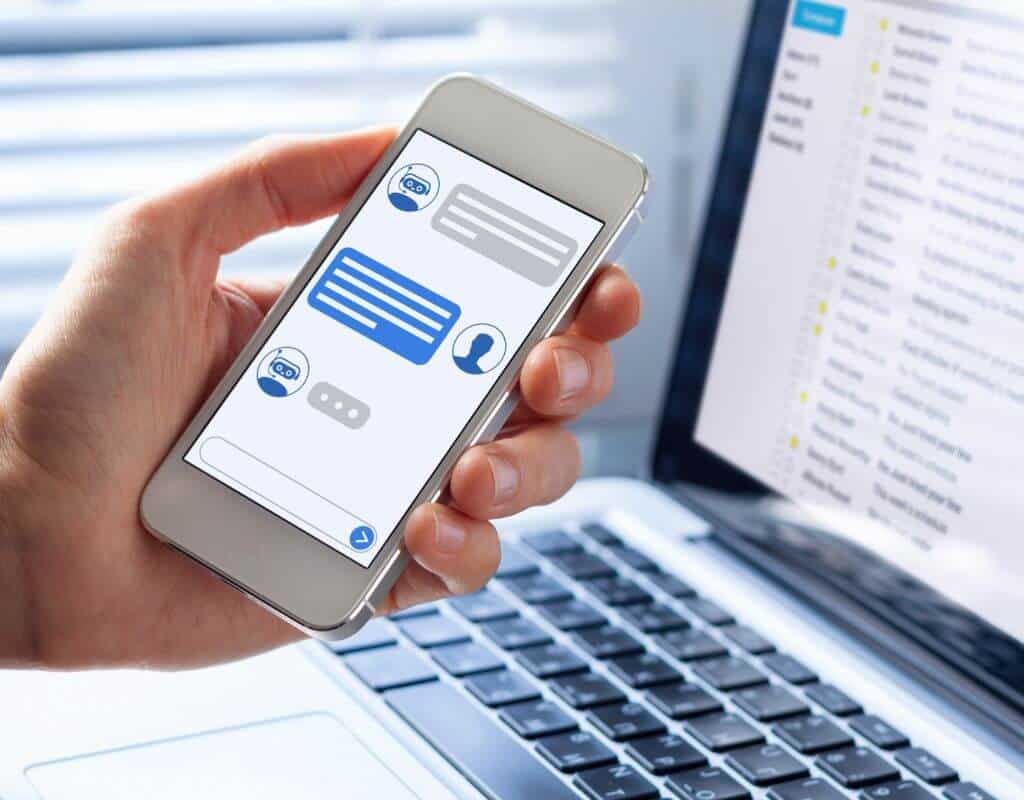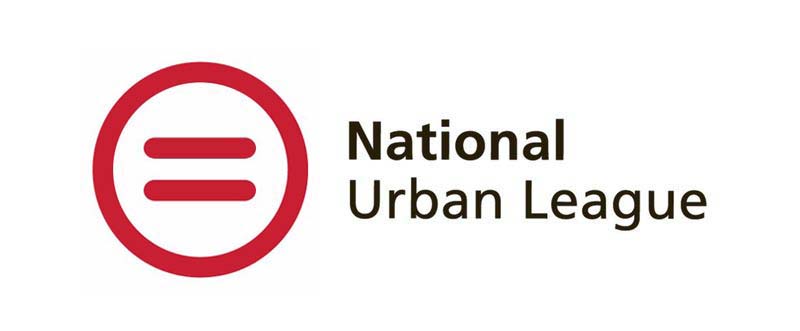While ChatGPT is a fun diversion in the middle of an otherwise dull day, there are plenty of ways to leverage this buzzy AI tech to help you in your job search. For example, writing a cover letter may not be your idea of a good time, but for ChatGPT it’s a snap.
But should you use ChatGPT to write your cover letters? Yes and no. Our tests found that what ChatGPT produces is well-written, but you can’t rely on the output alone to help you land an interview.
What Is ChatGPT?
Built on a large language model, ChatGPT makes it easier to ask questions and receive relatively life-like responses. For example, you can ask ChatGPT, “Why is the sky blue?” and it will attempt to reasonably answer your question as a friend might. What’s more, you can ask ChatGPT to redo and potentially improve the answer by asking it to “try again” using the same prompt.
Writing Cover Letters With ChatGPT
We wondered if ChatGPT could be leveraged to save time during a job search. What would it produce if we asked it to write a cover letter?
>>MORE: Should You Use ChatGPT for Interview Advice?
Chat GPT Cover Letter Examples
When we tested early versions of ChatGPT’s cover letter writing abilities, the results were less than stellar. Here are a few examples:
An entry-level investment banking cover letter:
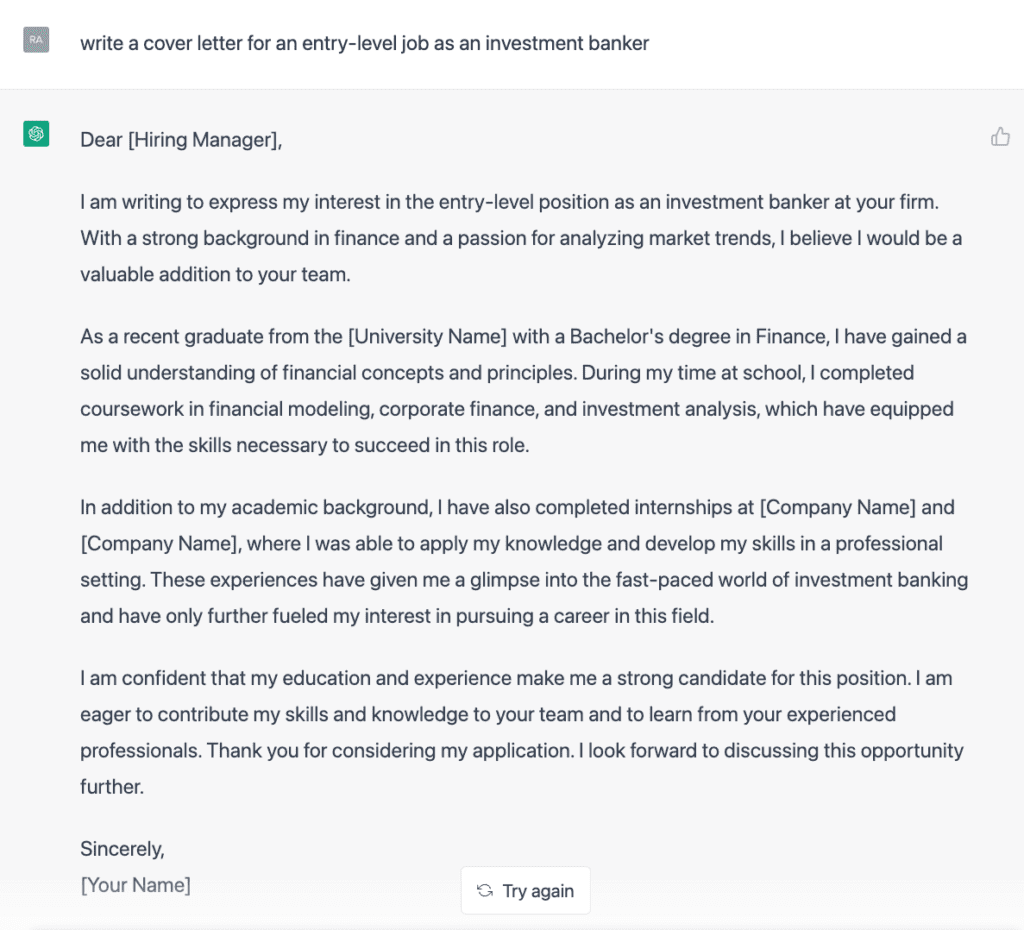
An accounting internship cover letter:
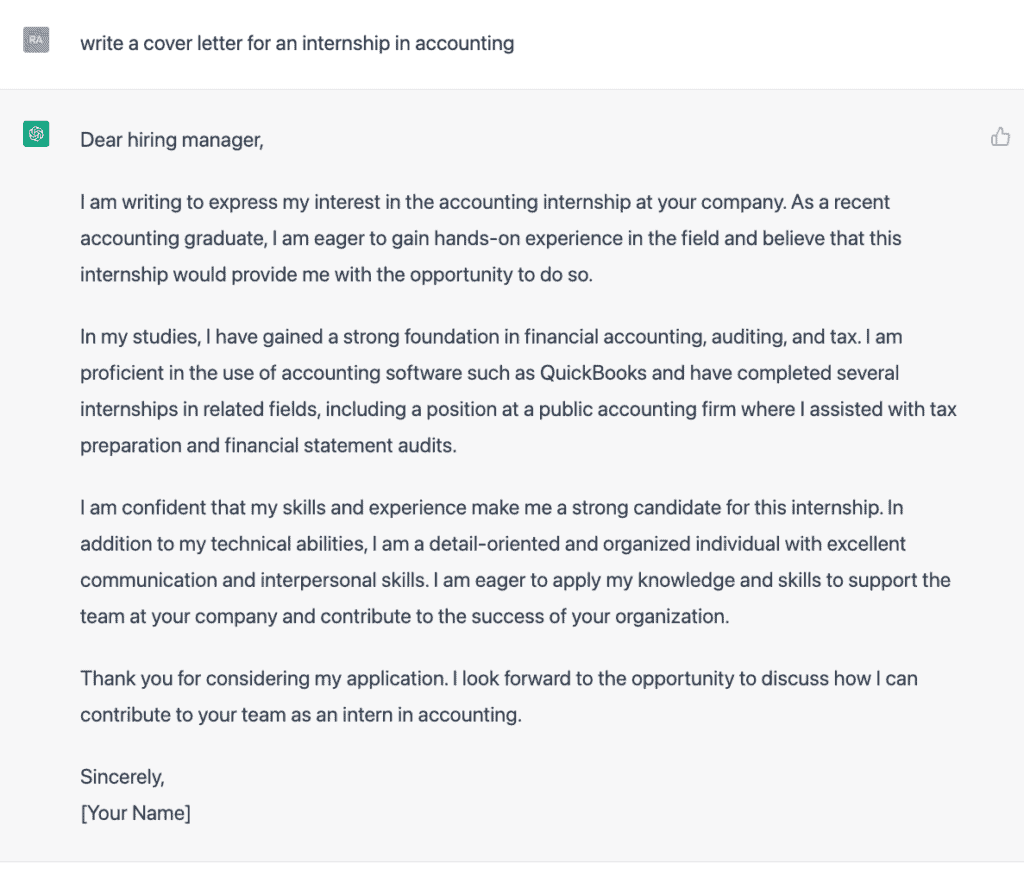
The cover letter for lead deckhand on a pirate ship:
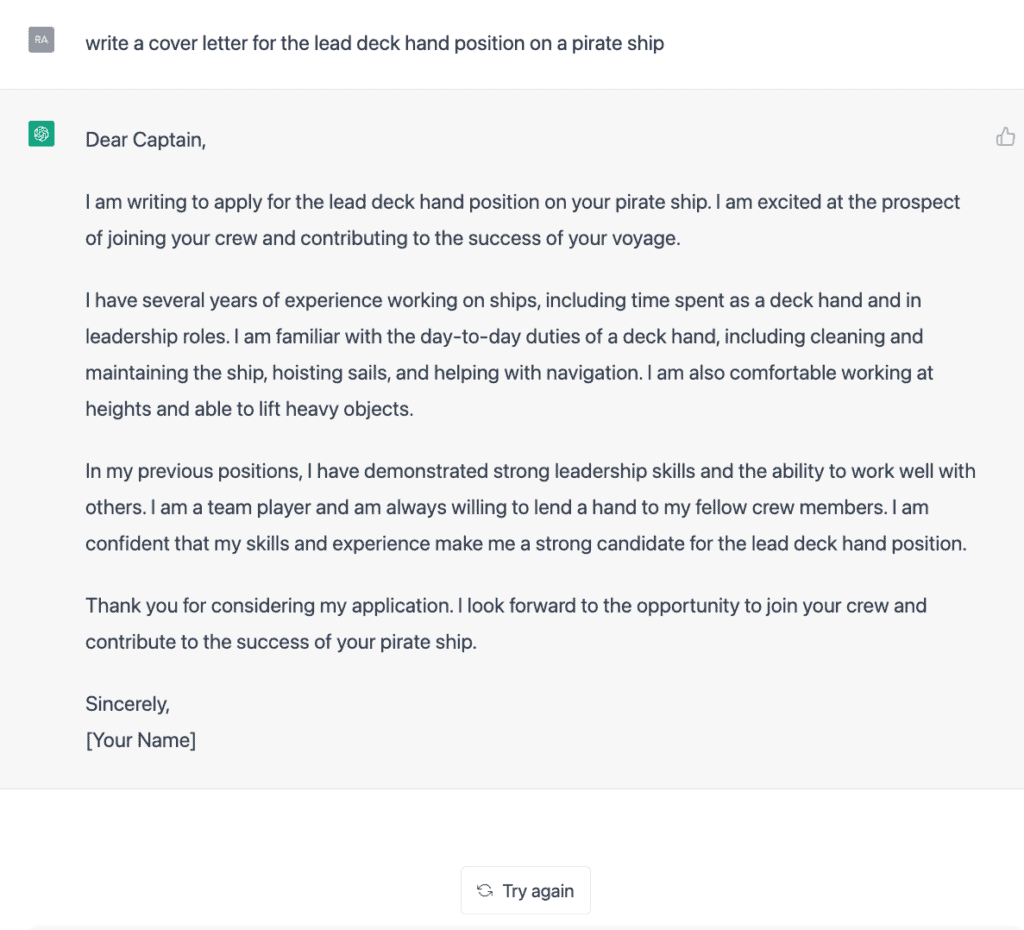
Overall, these are well-written cover letters. They follow general cover letter conventions, are polite, and explain why the writer is applying to the role. They also mention a few skills that might be necessary for success in the role, despite us not mentioning any skills as part of the prompt.

Resume Writing Masterclass
Learn the tips and tricks that will help you craft a resume that stands out in our free Resume Writing Masterclass.
Avg. Time: 5-6 hours
Skills you’ll build: Resume writing, transferable skills, summary, professional branding
However, they are exactly the kinds of cover letters you would not want to submit as your application.
Look at the lead deckhand cover letter, specifically the two middle paragraphs.
The second paragraph talks about the writer’s “several years of experience including time spent as a deckhand in leadership roles.” The third paragraph also mentions, “I have demonstrated strong leadership skills.”
While the writer should mention their leadership skills, especially because moving to lead deckhand is probably a step up the career ladder, there is no mention of how the writer used their leadership skills.
This is precisely what recruiters say job seekers should avoid. Saying you possess leadership skills is fine, but unless you explain how you used them, the phrase is meaningless.
And this is one of the problems of relying solely on ChatGPT’s outputs. Essentially, ChatGPT generates a draft, but it’s up to you to provide context. “ChatGPT can give you a great foundation, but you do need to provide it with guidance, and plan on taking it from 80% to 100% yourself,” says Bonnie Dilber, recruiting manager at Zapier.

Professional Skills
Learn how to identify your professional values and connect with a company that supports them in this free course from Discover Financial Services.
Avg. Time: 2-3 hours
Skills you’ll build: Planning, discovery, organization, self-reflection
“Remember that ChatGPT was designed around conversations and chat,” adds Miles Jennings, founder of Recruiter.com. “Be sure to continually edit its output. Experiment until you are satisfied with the results, but never rely on its initial output.”
For example, in the second paragraph of the deckhand cover letter, you could say:
I have several years of experience working on ships, including time spent as a deckhand and in leadership roles. For example, I was once asked to lead a raid on a village that was rumored to have an extensive gold reserve. I selected a team of eight deckhands, created the raiding plan, and successfully led my crew in under the cover of darkness. Not only were none of my crewmates killed, captured, or seriously injured, we also recovered nearly 10,000 gold pieces.
The rewrite is a clear and compelling example of how you use your leadership skills and, more importantly, what the positive impact was for the entire crew.
>>MORE: How to Use the STAR Method for Interview Questions
ChatGPT Prompts Matter
Part of the problem with these cover letters is that our prompts weren’t specific. We simply asked ChatGPT to write a cover letter. That’s a pretty generic ask, which is probably why we got a generic response that contains multiple hallucinations.
Because our prompts were so broad and vague, ChatGPT invented skills and abilities for our job seekers. For example, the cover letter for the accounting internship says the job seeker is proficient in QuickBooks, even though we never mentioned it.
This is another drawback of using ChatGPT to write your cover letter. One of the shortcomings with AI is your output will only be as good as the input. The less specific the prompt, the more ChatGPT has to “improvise” to fill your request.

Interview Success
Uncover the tips and tricks for interview success in this free course from BCLP. You'll learn how to ace a video interview, the online skills assessment, and more.
Avg. Time: 4-5 hours
Skills you’ll build: Video interviewing, public speaking, organization, time management
So, we tried again, asking ChatGPT to write a cover letter for a business development role at Forage and included some text from the job posting that describes some of the experience our team is looking for. Here’s the prompt:

And here’s what ChatGPT generated:
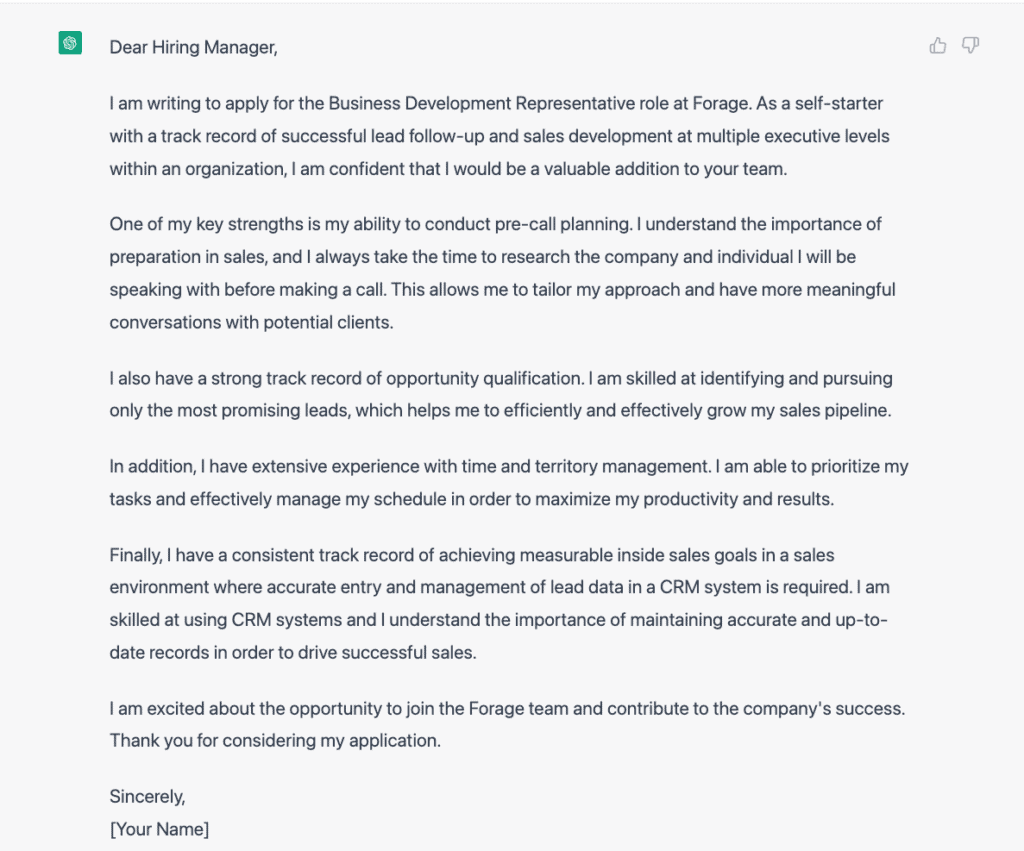
Once again, the cover letter is decent. However, it parroted back what we pasted in the input section without any explanation or context.
For example, the second paragraph talks about the writer’s ability to conduct pre-call planning (a keyword from the job description). While ChatGPT attempts to explain why pre-call planning is important, the explanation isn’t specific. It won’t help this job applicant stand out from the others because it doesn’t include any particulars about how this writer conducts pre-call planning.
>>MORE: Resume Keywords: What They Are and How to Use Them
ChatGPT Versions Make a Difference
When ChatGPT updated to version 4, we tested it to see if the bot had improved. Would it still parrot information? Create skills and abilities for the job seeker? Give context and meaning to any skills we do provide?
We paid the $20 fee to access ChatGPT-4 and asked it to generate a cover letter for an internship when the person has no work experience. Here’s what we got:
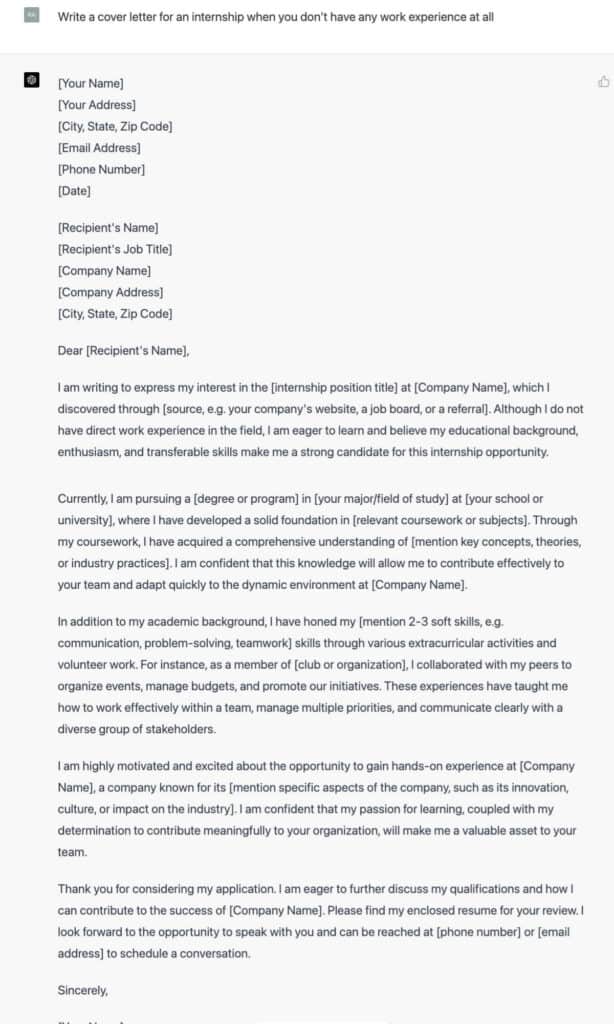
It’s worth noting that ChatGPT formatted the cover letter as a formal business letter. There’s an entire section devoted to the writer’s and recipient’s contact information. The bot even left space for full street addresses. Since cover letters are usually an in-body email message or pasted into an applicant tracking system (ATS), most people don’t include address information. It’s not incorrect to include it, but it’s not generally done these days.
Also of note, this cover letter doesn’t have many hallucinations. Though one or two slipped through (“I collaborated with my peers…”), ChatGPT generally wrote the cover letter “mad libs” style. At key points, ChatGPT inserted brackets and suggested what the writer should fill the blanks in with, like relevant coursework, two to three soft skills (even going the extra step of suggesting which soft skills to include), and mentioning specific aspects of the company.
And some of the hallucinations are exactly the kinds of things you’d probably include in a cover letter anyway. For example, saying the writer is “highly motivated and excited about the opportunity” is the kind of thing many people include in their cover letters all the time.

Building Your Personal Brand
Learn how to build and maintain your personal brand in this free course from Ashurst UK.
Avg. Time: 2-3 hours
Skills you’ll build: Personal brand, LinkedIn, brand management, reputation
Overall, this mad libs cover letter is an excellent outline for someone who doesn’t have a lot of relevant work experience or transferable skills. Instead of ChatGPT making assumptions about who you are and your skills, it suggests what should go where. The cover letter follows a natural and logical flow that explains why you want to intern with the company and why you’re a good candidate.
Frankly, it’s an excellent outline for any kind of job seeker!
Then we asked ChatGPT to write a cover letter for a business development role at Forage. Once again, we input part of the job posting as part of the prompt:
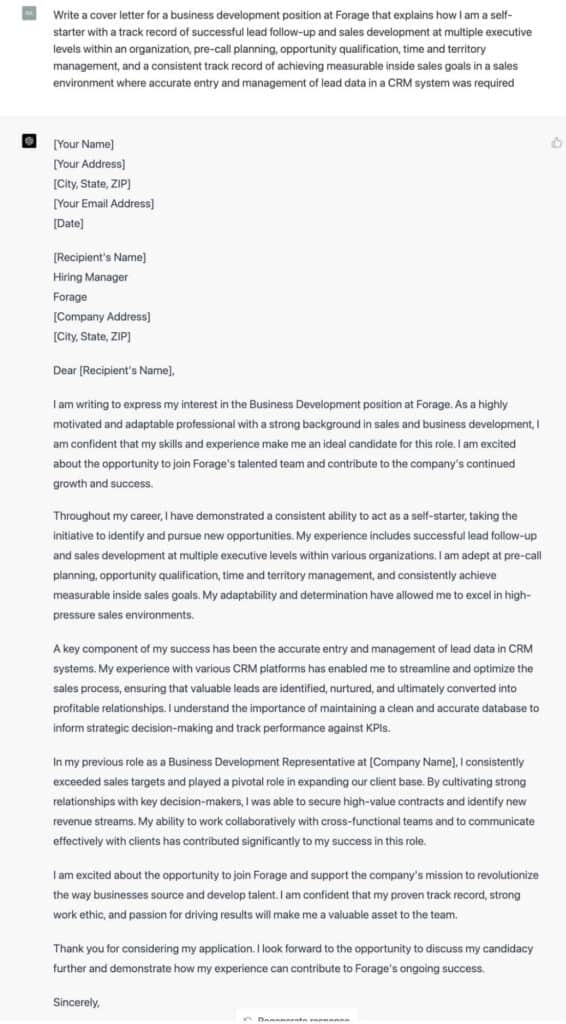
Overall, this is an improvement over the earlier version. It’s well-written and doesn’t parrot back the job description word-for-word. But it does include some hallucinations. That said, the hallucinations are an excellent example of using the STAR method to describe how you’ll bring value to the role:
I consistently exceeded sales targets and played a pivotal role in expanding our client base. By cultivating strong relationships with key decision-makers, I was able to secure high-value contracts and identify new revenue streams.
The one thing that would improve this paragraph (if it were true), would be stating how much money the new revenue streams brought in to the company.
And, of course, we asked ChatGPT for a cover letter for the lead deckhand role on a pirate ship:
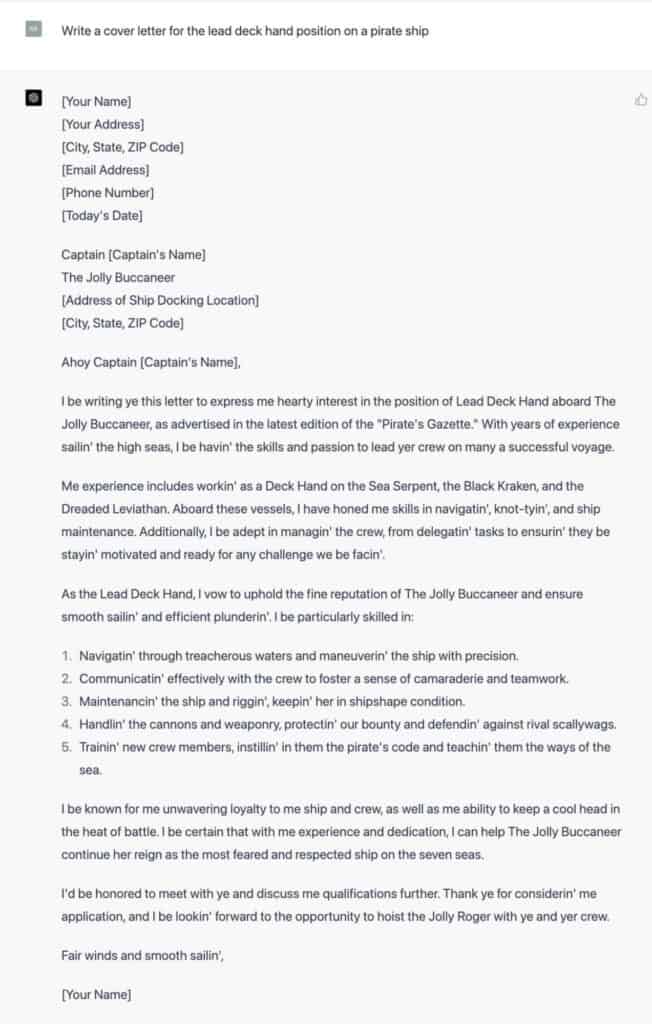
It’s fascinating that ChatGPT wrote the cover letter in “pirate voice” even though we didn’t prompt it to. There is something to be said for writing to your target audience! And though we’d argue that writing a cover letter like this could come across as gimmicky, it could also demonstrate that the writer truly understands this company’s culture.
Overall, it’s an excellent cover letter. Despite being entirely fictional (we think), it does an excellent job explaining how the writer is already acting as a lead deckhand. This person clearly possesses the skills to be a lead deckhand and also describes how they use their skills to better the crew and protect the ship (we rewrote these in non-pirate talk):
- I’m adept at managing the crew, including delegating tasks and ensuring they stay motivated and ready for any challenge we face.
- Communicate effectively with the crew to foster a sense of camaraderie and teamwork.
- Training new crew members, instilling in them the pirates’ code and teaching them the ways of the sea.
These are great examples of leadership abilities. The only thing that would improve it would be specific examples of using the skills. For example, how exactly does this deckhand ensure the crew is ready for challenges? Do they run weekend drills? Did they set up a training program?
>>MORE: 10 Common Leadership Interview Questions and Answers
Using ChatGPT to Write a Cover Letter for a Real Job Seeker
The problem with all of these cover letters is that they are for imaginary people applying for hypothetical jobs. All things considered, ChatGPT produced some decent cover letters. But outside of the mad libs version, these are nothing but hallucinations and not a true test of ChatGPT’s capabilities.
A better test would be how well ChatGPT writes a cover letter describing your accomplishments in a way that helps the recruiter or hiring manager understand how you’ll use your skills in a specific role at their company.
So, I gave ChatGPT the most detailed and specific prompt I could to see if the bot could write a cover letter explaining why I should be the head writer at Forage. I input my job description, then asked ChatGPT to write a cover letter for the job. I included my resume as part of the input and instructed ChatGPT to only use information from it.
Before I show you the output, keep in mind it’s from ChatGPT-4 not 3 or 3.5:
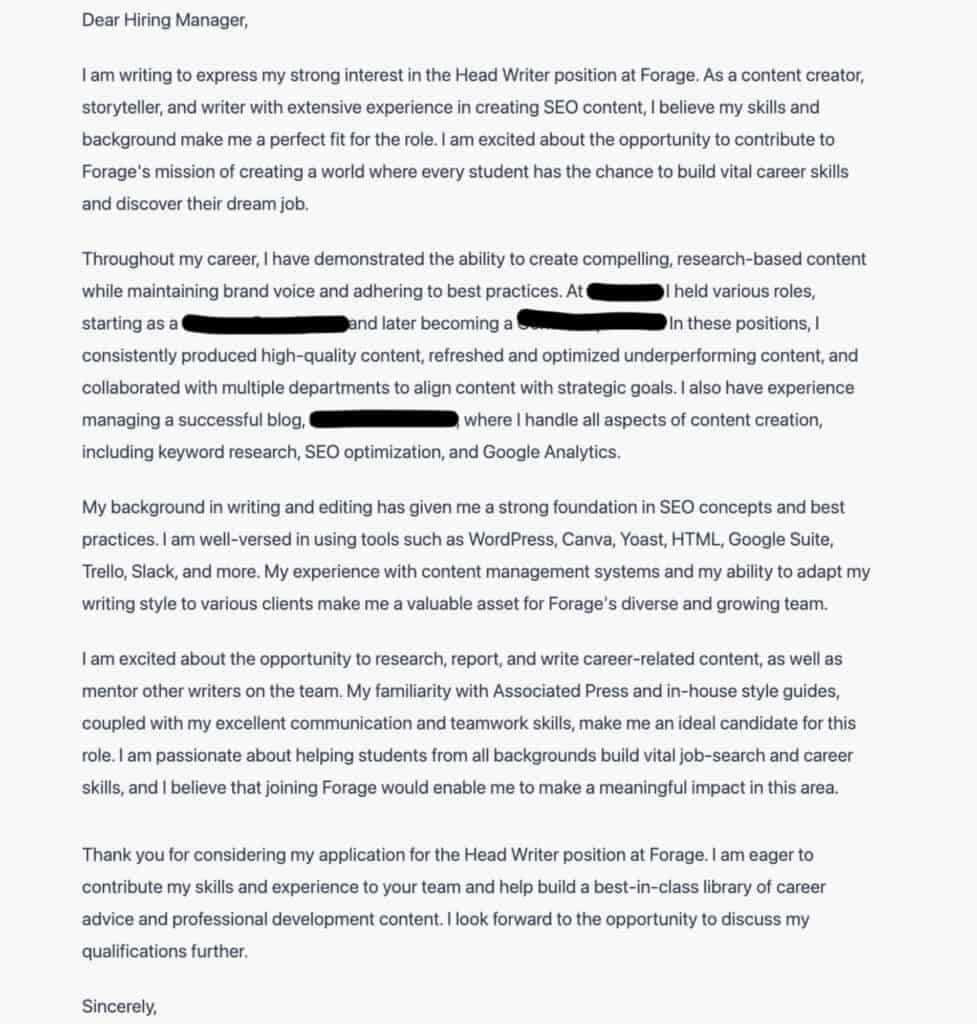
My first reaction is that this cover letter isn’t bad. ChatGPT did precisely as requested and wrote a cover letter using only the information on my resume, thus eliminating the hallucinations. I can confidently say this cover letter accurately summarizes my resume.
But that’s all this cover letter is: a repeat of my resume in cover letter form, which is what you don’t want. A cover letter is where you talk about the things that aren’t on your resume. ChatGPT didn’t include any quantifiable achievements from my resume.
It also has errors that, while minor, could significantly impact my application. First, ChatGPT writes about my present position in past tense, implying that I’ve already left the role. While that’s more of a grammatical error than a hallucination, if I didn’t proofread the letter carefully, that could create a problem with my candidacy. Am I still employed or not? Am I terrible at self-editing (not a great look for a writer)?
And, it’s boring. That’s not necessarily a bad thing (depending on the role), but this cover letter reads like almost any cover letter. Nothing in it details why I’m the best person for the role.

You Are Extraordinary
Learn how to identify and conquer imposter syndrome in this free course from Ashurst UK.
Avg. Time: 3-4 hours
Skills you’ll build: Growth mindset, social identity, self-expression, interview prep
Should ChatGPT Write Your Cover Letter?
The cover letter ChatGPT produced for me was an accurate summary of my resume but not much more. Despite the hyper-specific prompt, it doesn’t have the personalization and, well, human touch that makes a cover letter shine or help the recruiter or hiring manager understand why I’m the perfect fit for the role. And it didn’t do a good job telling a cohesive story or explaining how each of my work experiences builds on the other.
Of course, I’m an experienced writer. Not everyone is, so turning to ChatGPT could help someone who’s stuck. After all, the mad libs cover letter was an outstanding outline.
So, should ChatGPT write your cover letter?
“I think ChatGPT can help you customize your content quickly,” says Dilber. “[You can] take one cover letter and have ChatGPT convert it to a cover letter for another role or company, for example. It will certainly accelerate your ability to apply to more roles with a customized application. And that can speed things up if you’re trying to submit lots of applications. But that doesn’t mean the quality of work it produces will be better than what you can create yourself. Nothing ChatGPT writes will be as strong and engaging as what a human could come up with.”
And Jennings agrees. “It’s a creative editor, a guide, and a (very) smart friend. But understand that it’s up to you to deeply personalize your own writing, especially with a highly individualized document such as a resume or cover letter.”If you’re having trouble getting started, are struggling with writer’s block, or can’t seem to find the right words, ChatGPT can be helpful in providing you a draft to work with. It generates clear outlines that give you an excellent starting point for creating application materials. But don’t rely on the output alone. You’ll need to tweak, customize, and add context to whatever ChatGPT produces to ensure you submit a cover letter that sings your praises.
Image credit: Canva
Frequently Asked Questions
Not really. Most recruiters say it’s no different than going to a human writer and asking for their assistance.
That really depends on the employer! That said, more and more job postings are specifically stating you can’t use AI in your application. While AI detectors aren’t perfect (yet!), a quick search on LinkedIn reveals recruiters and hiring managers stating they read the exact same cover letter four times in a row, meaning it’s clear the applicant used AI to generate it.
There are ChatGPT detection tools, so anything is possible, but they aren’t always accurate. This may change as detection tools become more sophisticated.
It’s not technically considered plagiarism, as the output is original.
While it’s not illegal to lie during an interview, consider what the consequences might be if you didn’t tell your interviewer and they found out after they hired you.
It may be OK to use ChatGPT for interview advice, but do so with caution since the advice can be outdated and inaccurate.
